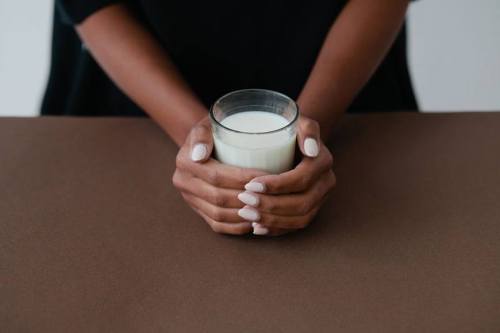Is cockroach milk *actually* a healthy dairy alternative?
Cockroach milk has been setting the internet abuzz with news of its health-boosting benefits. But insect-milk and health experts claim the stuff might not actually be healthy for you. Here's what to know about the edition on the alt-milk scene.

The concept of bugs being fit for human consumption is not exactly novel. Entire restaurants are dedicated to the cooking ideology, Ikea is currently testing bug burgers, and insect protein has been carving out space in the food market for some time now. But when the potentially the most nauseating combination of words ever—cockroach milk—recently infested the internet, it felt like a whole other level of ew.
While some folks are championing the health-boosting benefits of the protein-packed super-gross superfood, the mere idea of it is efficiently fueling my nightmares—and I know I’m not alone. So, inquiring minds need to know: Is cockroach milk nutritiously worth its associated ick factor?
Cockroach milk isn’t scalable or sustainable because, currently, it can only be extracted in lab environments and in small quantities.
To figure it out, I talked to a spokesperson of Gourmet Grubb, a South African company that hopes to make (it’s not yet available) ice cream from EntoMilk, which is a sustainably farmed and produced insect-derived-milk. EntoMilk does not include cockroach milk, a product that is very different, the spokesperson explains. “Cockroach milk is the secretion from the Pacific beetle cockroach (only this species) for their offspring, and it is technically called a milk for that reason.”
However, since cockroach “milk” is super strong and concentrated, it’s best to stick with oat milk for the base of your alt-milk latte. (Phew.) The spokesperson says the milk, which has protein crystals, should really only be used in small doses to enhance medicines or foods to feed malnourished populations. Additionally, cockroach milk is not exactly scalable or sustainable because, currently, it can only be extracted in lab environments and in small quantities.
Furthermore, some health professionals say there isn’t evidence to support cockroach milk actually being healthy for you at all. “It remains to be seen if the roach milk is safe for human consumption and, if it is, what nutrients will remain after processing,” Katherine Brooking, RD, co-founder of nutrition website Appetite for Health, told Women’s Health.
So, there you have it: You can officially continue avoiding roaches like your life depends on it, with expert advice on your side.
If you need an alt-milk option, here’s your guide to navigating nut milks and one brand that’s bringing the stuff to the masses.
Sign Up for Our Daily Newsletter
Get all the latest in wellness, trends, food, fitness, beauty, and more delivered right to your inbox.
Got it, you've been added to our email list.










